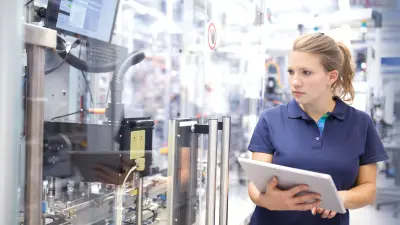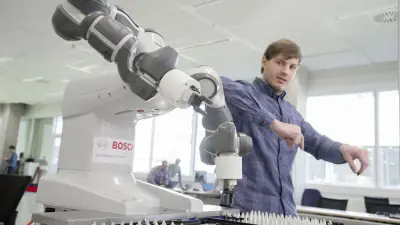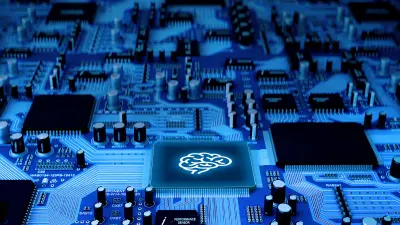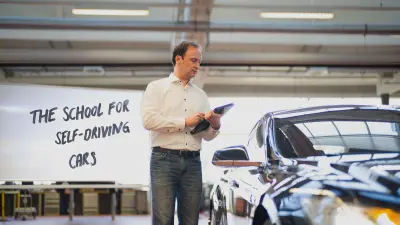Where Europe can lead the way in AI

2019-10-18
Self-assurance instead of alarm: in artificial intelligence, European industry has unique strengths
by Dr. Volkmar Denner
When talk about the subject of future technologies turns to Europe nowadays, it generally bemoans the continent’s dwindling digital competitiveness. People ask what role Europe can play in a world that is increasingly dancing to the tune of the platform economy, and in which the United States and China are locked in a race to the wire for the ultimate prize of AI dominance. It is a view that sees the old world as lagging behind, especially technologically, and dependent on others when it comes to the basics of IT.
There is certainly a grain of truth here, but it doesn’t tell the whole story. After all, Europe has strengths that other countries do not — strengths in combining the internet of things with industrial processes, and especially in applying artificial intelligence to manufacturing. It’s high time for Europe to be more self-assertive, and to adopt an innovation policy that plays to our strengths.
“Some say Europe is dependent on others when it comes to the basics of IT. There is certainly a grain of truth here, but it doesn’t tell the whole story.”

Catching up with the vanguard: more resources for AI
For many opinion leaders, it would seem that Europe’s inferiority is a foregone conclusion, especially in artificial intelligence. With headlines such as “artificial incompetence,” the German government’s AI strategy is pilloried. Internationally speaking, of course, it’s true — the 3 billion euros in funding they’ve pledged puts Germany squarely mid-pack when it comes to supporting AI. The government can and must do more here. And yet, such criticism is too simplistic, too black and white. When AI is discussed, it is usually viewed from the standpoint of the major U.S. technology companies that earn their money with data-based services. It is worth countering this standpoint by considering the idea of industrial value chains. This is an area in which Europe, and not least Germany, can be globally competitive, if not global market leaders with AI.
In its contest with China and the United States, the German manufacturing industry in particular stands a chance if it focuses on its three strengths: first, the manufacture of complex physical products, second, the digital combination of machinery and product data, and, third, the establishment of ecosystems comprising academic institutions, startups, small and medium-sized enterprises, and major industrial enterprises. In this way, Germany’s expertise in industrial AI can be harnessed to make a crucial contribution to its future economic success and, not least, to its citizens’ quality of life.
AI in the car: a camera understands what it sees
This approach differs in one fundamental aspect from the technology giants’ strategy. For them, artificial intelligence is primarily about creating models of human behavior, focusing especially on purchasing preferences. The European approach, by contrast, focuses on the world of objects. Whether in an automotive emergency braking assistant or when identifying faulty parts in production — in these cases, artificial intelligence is not telling machines what people are up to, but explaining the physical world to machines. Our latest camera for automated driving uses AI to understand what it sees, and can in this way enhance functions such as the emergency braking assistant. Companies like Bosch want to harness the power of artificial intelligence not for the purpose of creating models of human behavior, but instead to improve technology.

“Companies like Bosch want to harness the power of artificial intelligence not for the purpose of creating models of human behavior, but instead to improve technology.”
AI in industry: how machines learn

It is an approach that is already giving rise to real applications in manufacturing. One such application is ViPAS, an AI-based system for visual quality control. The system’s image-processing function no longer has to be painstakingly programmed. Its neural networks use patterns to learn what is faulty and what is not. Equipped with a gripper, camera, and deep-learning software, ViPAS can reliably identify faulty parts. As part of a pilot project at the Bosch plant in Nuremberg, Germany, ViPAS completed 12,000 test procedures with a success rate of 99.9 percent. This is what artificial intelligence should be like — safe, robust, and explainable, and relieving human workers of routine tasks. Even with AI, machines will not simply replace people. However, they may create the freedom in which their unique creativity can thrive — or at least complement this creativity.
Practical orientation: bonus for AI researchers
But how can we stay on the cutting edge of AI? It is crucial that theory and practice be closely intertwined. This is why a technology company like Bosch does not just run its own center for artificial intelligence but also, and just as importantly, collaborates with the scientific community. In Germany, for example, Bosch is a founding member of Baden-Württemberg’s “Cyber Valley,” and is among other things investing 35 million euros in the construction of an AI campus at the University of Tübingen. In the future, some 700 experts will work there on AI applications. When competing for the best young talent in AI, the German manufacturing industry’s practical orientation is an advantage that should not be underestimated. It is an appealing alternative for experts who want to improve real products.

All for one: AI made in Europe
In this respect, the German government is right to adopt an AI strategy that encourages the establishment of research and competence centers with a strong practical bent. That said, the grants and subsidies should not be distributed piecemeal, but focus on a few high-caliber centers. And whatever we do in Germany, we have to think on a European scale. When it comes down to it, there’s also potential in the interplay between German engineering and French mathematics. Together, we can take European-made AI forward.
First published in the Wirtschaftswoche on 10/18/19

